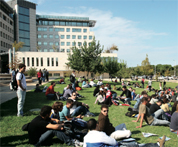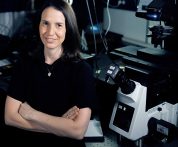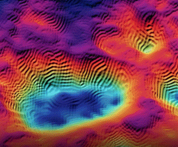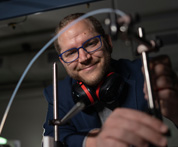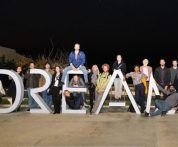Even before entering graduate school, Christine Hall worked at the Smithsonian Institution on ostracodes, small bivalved crustaceans that are found in abundance in marine and freshwater settings. Ostracode microfossils are an excellent organism for studying climate change, and are at the center of Dr. Hall’s current research in the Department of Marine Geoscience at the University of Haifa. Understanding the response of organisms to global warming (‘biotic sensitivity’) remains a major unknown in climate change research and is crucial in evaluating predictions of the future impact of climate change on the Earth’s systems.
For her doctorate at the University of California, Riverside’s Department of Earth and Planetary Sciences, Dr. Hall examined how ostracodes’ size and diversity changed in response to the Eocene, a warming event that took place between 56 and 33 million years ago. She continued to study their relationships to past environmental changes during a postdoc at the University of Connecticut. Her current research examines ostracode microfossils to see how their specific environmental tolerances can help identify Pliocene paleoenvironmental shifts (from 5 million to 2 million years ago). She collects ostracode-rich sediment samples from the central Jordan valley and Mt. Sedom, comparing environmental shifts that occurred at the two sites.
Dr. Hall’s research is connected to several other projects investigating the paleoclimate of the Levantine Corridor, fostering additional collaborations and expanding the project’s impact.
A sought-after teacher in courses like “Oceanography” and “Headlines in the History of Life”, Dr. Hall believes in “the importance of leading by example in helping people understand the important role that science has to play in our society.”
 ISRAELI COUNCIL FOR HIGHER EDUCATION
ISRAELI COUNCIL FOR HIGHER EDUCATION MIT-Israel Zuckerman STEM Fund for Faculty Collaboration
MIT-Israel Zuckerman STEM Fund for Faculty Collaboration The Zuckerman Travel and Research STEM Fund at Harvard
The Zuckerman Travel and Research STEM Fund at Harvard Zuckerman AI Fund at Technion
Zuckerman AI Fund at Technion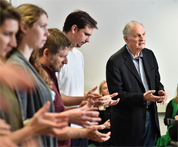 Alan Alda Communicating Science
Alan Alda Communicating Science Zuckerman Institute – ScienceAbroad
Zuckerman Institute – ScienceAbroad Zuckerman Institute – America-Israel Friendship League partnership
Zuckerman Institute – America-Israel Friendship League partnership



